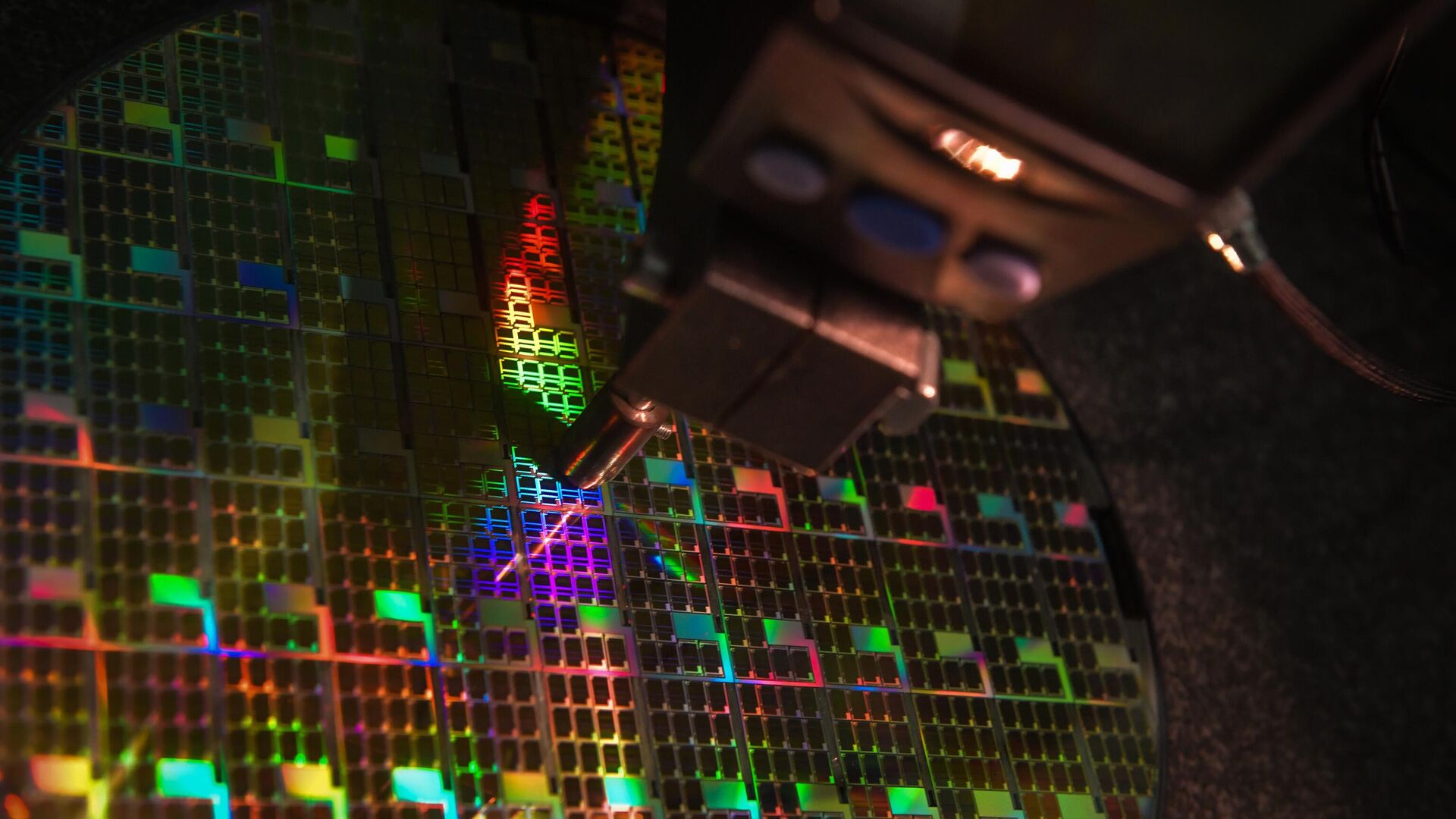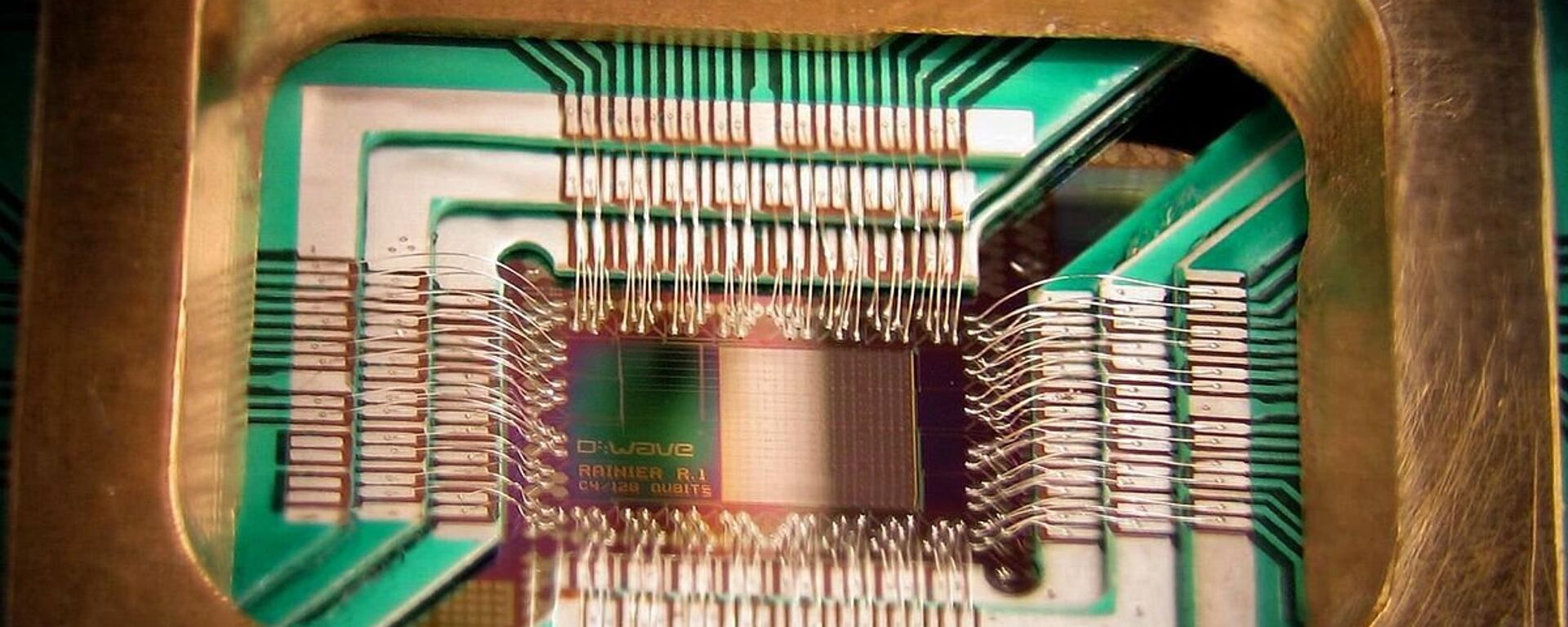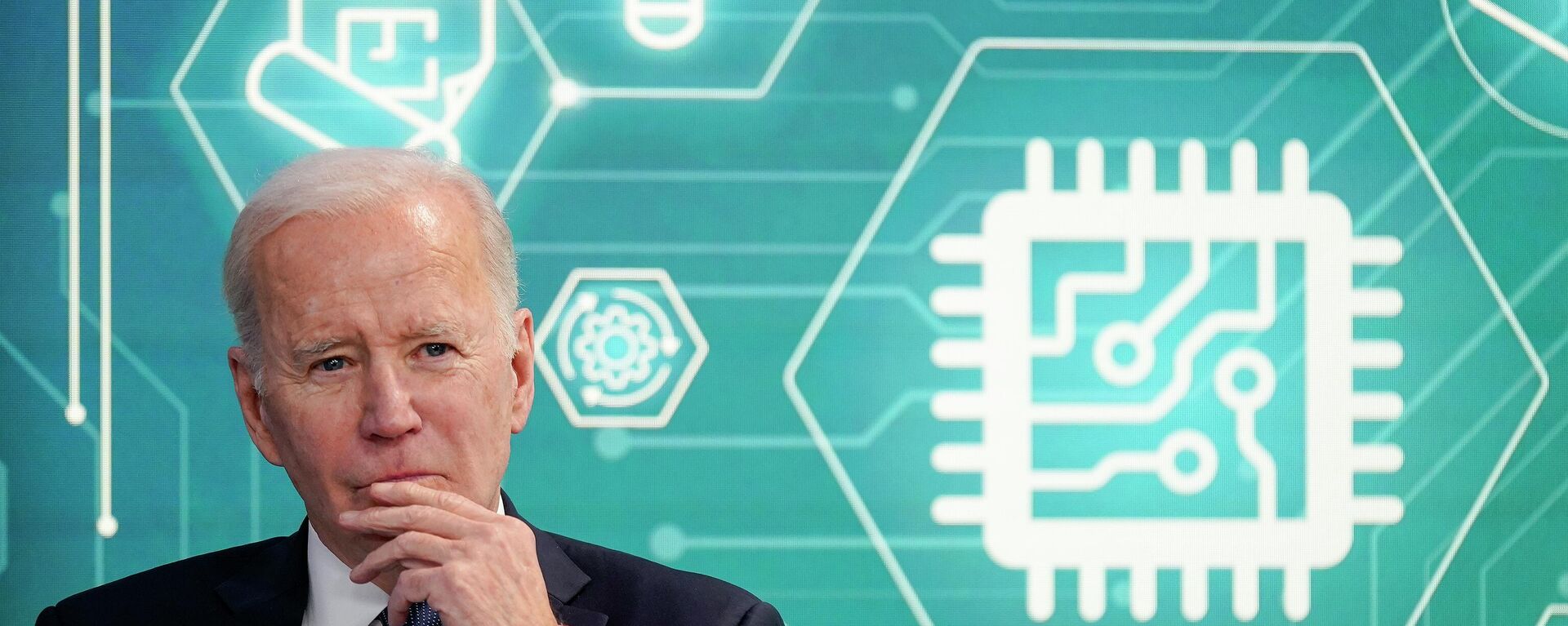https://sputnikglobe.com/20230728/does-the-us-make-their-own-microchips-1112216417.html
Does the US Make Their Own Microchips?
Does the US Make Their Own Microchips?
Sputnik International
The Senate has okayed a legislation aimed to speed up the construction of semiconductor facilities in the US. Will the bill help America resuscitate its chip production? Check Sputnik to find out.
2023-07-28T14:50+0000
2023-07-28T14:50+0000
2023-07-28T14:50+0000
sputnik explains
us
chips
production
us senate
bill
industry
https://cdn1.img.sputnikglobe.com/img/07e7/07/13/1111991456_0:320:3072:2048_1920x0_80_0_0_3ccbfef9c0d67496bb943c3da0664cc8.jpg
What is Microchip?A microchip is a substance, typically made of silicon, which has specific electrical properties that allows it to serve as a foundation for computers and other electronic devices. A microchip, for example, conducts electricity more than an insulator, but less than a pure conductor.Also known as chips, semiconductors and semis, microchips can be found in such products as smartphones, appliances, gaming hardware, and medical equipment.Who Controls Global Chip Industry?Taiwan remains the world's undisputed leader in terms of raw semiconductor manufacturing and supplying. The island currently produces more than 60% of the world's semiconductors and over 90% of the most advanced ones.Most semis are manufactured by a single company, Taiwan Semiconductor Manufacturing Corporation (TSMC), which also controls more than half of the global semiconductor foundry market, by revenue.What is US' New Chip Bill All About?The US Senate approved legislation on chips by a vote of 94-3 on Thursday. The document, which was included in an amendment package to the annual defense policy bill, stipulates speeding up the construction of US chip facilities by exempting certain projects from often lengthy environmental reviews.The environmental exemption would apply to certain projects that receive grants under the CHIPS and Science Act, which was signed by President Joe Biden into law last year.What's 'CHIPS and Science' Act's Goal?In a 64-33 vote, the US Senate approved the "CHIPS and Science" act in July 2022, a document which envisages earmarking about $52 billion in government subsidies for domestic microchip manufacturers. The document also authorizes allocating over $170 billion in the next five years to boost US scientific research aimed at better competing with China when it comes to chip production.How Did POTUS React to CHIPS Act?US President Joe Biden called the "CHIPS and Science" act one of the top priorities of his agenda, claiming that it “will accelerate the manufacturing of semiconductors in America, lowering prices on everything from cars to dishwashers.”What Did Other Officials Say?US Commerce Secretary Gina Raimondo stressed that "The chips funding will be the deciding factor on where those companies choose to expand. We want them, we need them, to expand here in the United States."“I told our caucus yesterday that our grandchildren will hold good-paying jobs in industries we can’t even imagine because of what we are doing now. [...] This is going to go down as one of the major bipartisan achievements of this Congress,” he added.Does America Produce Its Own Semis?It’s worth recalling that the US – a country, where chips were invented back in 1958, manufactured about 37% of the world's chip supply in the 1990s. Subsequent years, however, saw an about-face, with only about 12% of all semiconductors being produced in America at the moment, according to Raimondo.In other words, it has become cheaper for American firms to build chip facilities in countries outside the US, with foreign governments offering “more attractive financial incentives to construct semiconductor factories, like tax breaks and grants.”“There's also less regulation in places like Asia. On top of that, there aren't as many jobs in the US created to run such high-tech factories,” the outlet added.Is US Building Chip Plants?Right now, the White House is pumping hundreds of billions of dollars into constructing new chip manufacturing facilities in America in a bid to revive semiconductor production.For example, the US chip giant Intel is building four chip production plants, two in Arizona and two in Ohio, plus one advanced packaging facility in New Mexico. Another American chip behemoth, Micron Technology, earlier announced that it would spend $20 billion to build what it called the largest ever US semiconductor factory to be located in Onondaga County, New York.In a separate development, Germany and Intel earlier clinched a deal on the US chipmaker receiving an alleged subsidy package of $10.91 billion to build its planned factory in the eastern German city of Magdeburg.The facility will reportedly be the size of 40 American football fields and is expected to provide close to 50,000 jobs for the region, including “9,000 high paying Micron jobs.” Once completed, the plant is expected to significantly increase the domestic supply of memory chips.Samsung, in turn, is building a $17 billion chip fabrication plant, in Taylor, Texas, pledging to start the first US production of advanced chips as early as next year Why Does Semis Shortage Pose Security Risk to US?Raimondo previously described the semiconductor shortage in her country as a “national security” issue because she said it had exposed the dependency of US manufacturing on imports of semiconductors from abroad.She was echoed by Treasury Secretary Janet Yellen, who admitted that "the only country in the world that is a source of the most advanced semiconductors is Taiwan.”A US shortage of chips during the COVID-19 pandemic, which wrapped up earlier this year, prompted price hikes and supply-chain disruptions in several industries.Who are US' Main Chip Suppliers?A report issued by an American news agency earlier this year revealed that when it comes to US chip imports, Thailand, Vietnam, India, and Cambodia emerged as the "early winners" in 2023 as "semiconductor production begins to move away from traditional centers such as Taiwan and China."India saw its chip shipments to the US skyrocket 34 times to $152 million, while Cambodia indicated a whopping 698% surge – from $20 million last year to $166 million in February 2023, according to the report. Vietnam and Thailand boosted their US trade in the sector by 75% and 62%, respectively.Asia currently accounts for more than 80% of US chip imports, and apart from Taiwan, China, Thailand, Vietnam, India, and Cambodia, America gets semiconductors from Malaysia, South Korea, Japan, and the Philippines. Other countries include Mexico, Canada, Germany, the UK, France, Switzerland, and the Netherlands.In a separate report, an American news agency pointed out that the value of US semiconductor imports increased by about 13% over the first three months of this year, in a sign that "there's a long way to go before the country can satisfy its chip needs at home."
https://sputnikglobe.com/20230721/taiwanese-semiconductor-giant-delays-arizona-plant-production-amid-us-china-chip-race-1112027823.html
https://sputnikglobe.com/20230628/us-considering-news-restrictions-on-exports-of-ai-chips-to-china---reports-1111516345.html
Sputnik International
feedback@sputniknews.com
+74956456601
MIA „Rosiya Segodnya“
2023
Oleg Burunov
https://cdn1.img.sputnikglobe.com/img/07e4/09/0b/1080424846_0:0:2048:2048_100x100_80_0_0_3d7b461f8a98586fa3fe739930816aea.jpg
Oleg Burunov
https://cdn1.img.sputnikglobe.com/img/07e4/09/0b/1080424846_0:0:2048:2048_100x100_80_0_0_3d7b461f8a98586fa3fe739930816aea.jpg
News
en_EN
Sputnik International
feedback@sputniknews.com
+74956456601
MIA „Rosiya Segodnya“
Sputnik International
feedback@sputniknews.com
+74956456601
MIA „Rosiya Segodnya“
Oleg Burunov
https://cdn1.img.sputnikglobe.com/img/07e4/09/0b/1080424846_0:0:2048:2048_100x100_80_0_0_3d7b461f8a98586fa3fe739930816aea.jpg
chip production, us chip giants, covid-19 pandemic, chip shortage, "chips and science" act, us president joe biden, revival of chip industry
chip production, us chip giants, covid-19 pandemic, chip shortage, "chips and science" act, us president joe biden, revival of chip industry
Does the US Make Their Own Microchips?
The Senate has okayed legislation aimed at speeding up the construction of semiconductor facilities in the US. Will the bill help America revive its chip industry, and does the United States currently manufacture its own semiconductors? Check this Sputnik article to find out.
A microchip is a substance, typically made of silicon, which has specific electrical properties that allows it to serve as a foundation for computers and other electronic devices. A microchip, for example, conducts electricity more than an insulator, but less than a pure conductor.
Also known as chips, semiconductors and semis, microchips can be found in such products as smartphones, appliances, gaming hardware, and medical equipment.
Who Controls Global Chip Industry?
Taiwan remains the world's undisputed leader in terms of raw semiconductor manufacturing and supplying. The island currently produces more than 60% of the world's semiconductors and over 90% of the most advanced ones.
Most semis are manufactured by a single company,
Taiwan Semiconductor Manufacturing Corporation (TSMC), which also controls more than half of the global semiconductor foundry market, by revenue.
What is US' New Chip Bill All About?
The US Senate approved legislation on chips by a vote of 94-3 on Thursday. The document, which was included in an amendment package to the annual defense policy bill, stipulates speeding up the construction of US chip facilities by exempting certain projects from often lengthy environmental reviews.
The environmental exemption would apply to certain projects that receive grants under the CHIPS and Science Act, which was signed by President Joe Biden into law last year.
What's 'CHIPS and Science' Act's Goal?
In a 64-33 vote, the US Senate approved the "CHIPS and Science" act in July 2022, a document which envisages earmarking about $52 billion in government subsidies for domestic microchip manufacturers.
The goal is to incentivize construction of domestic semiconductor manufacturing plants, also known as “fabs”, to make the chips.
The document also authorizes allocating over $170 billion in the next five years to boost US scientific research aimed at better competing with China when it comes to chip production.
How Did POTUS React to CHIPS Act?
US President Joe Biden called the "CHIPS and Science" act one of the top priorities of his agenda, claiming that it “will accelerate the manufacturing of semiconductors in America, lowering prices on everything from cars to dishwashers.”
“It also will create jobs — good-paying jobs right here in the United States. It will mean more resilient American supply chains, so we are never so reliant on foreign countries for the critical technologies that we need for American consumers and national security,” Biden argued.
What Did Other Officials Say?
US Commerce Secretary Gina Raimondo stressed that "The chips funding will be the deciding factor on where those companies choose to expand. We want them, we need them, to expand here in the United States."
Democratic Senate Majority Leader Charles Schumer touted the document as one of "the most significant, long-term-thinking bills we’ve passed in a very long time.”
“I told our caucus yesterday that our grandchildren will hold good-paying jobs in industries we can’t even imagine because of what we are doing now. [...] This is going to go down as one of the major bipartisan achievements of this Congress,” he added.
Does America Produce Its Own Semis?
It’s worth recalling that the US – a country, where chips were invented back in 1958, manufactured about 37% of the world's chip supply in the 1990s. Subsequent years, however, saw an about-face, with only about 12% of all semiconductors being produced in America at the moment, according to Raimondo.
When once dwelling on the matter, one American news outlet explained that “chips are difficult to produce, and it's cheaper for US companies to outsource.”
In other words, it has become cheaper for American firms to build chip facilities in countries outside the US, with foreign governments offering “more attractive financial incentives to construct semiconductor factories, like tax breaks and grants.”
“There's also less regulation in places like Asia. On top of that, there aren't as many jobs in the US created to run such high-tech factories,” the outlet added.
Is US Building Chip Plants?
Right now, the White House is pumping hundreds of billions of dollars into constructing new chip manufacturing facilities in America in a bid to revive semiconductor production.
For example,
the US chip giant Intel is building four chip production plants, two in Arizona and two in Ohio, plus one advanced packaging facility in New Mexico. Another American chip behemoth, Micron Technology, earlier announced that it would spend
$20 billion to build what it called the largest ever US semiconductor factory to be located in Onondaga County, New York.
In a separate development, Germany and Intel earlier clinched a deal on
the US chipmaker receiving an alleged subsidy package of
$10.91 billion to build its planned factory in the eastern German city of Magdeburg.
The facility will reportedly be the size of 40 American football fields and is expected to provide close to 50,000 jobs for the region, including “9,000 high paying Micron jobs.” Once completed, the plant is expected to significantly increase the domestic supply of memory chips.
This came after other chipmakers, including South Korea’s Samsung and Taiwan’s TSMC proposed an array of projects on US territory amid Washington’s efforts to restore chip manufacturing in America. TSMC earlier committed at least $12 billion to build a semiconductor fabrication plant in Arizona, with production expected to begin in 2024.
Samsung, in turn, is building a $17 billion chip fabrication plant, in Taylor, Texas, pledging to start the first US production of advanced chips as early as next year
Why Does Semis Shortage Pose Security Risk to US?
Raimondo previously described the
semiconductor shortage in her country as a “national security” issue because she said it had exposed the dependency of US manufacturing on
imports of semiconductors from abroad.
She was echoed by Treasury Secretary Janet Yellen, who admitted that "the only country in the world that is a source of the most advanced semiconductors is Taiwan.”
"I would regard that as a resilience risk and also a national security risk," Yellen said, adding that the US is highly dependent on China for certain supplies, like lithium and the processing of some of the minerals that go into electric batteries.
A US shortage of
chips during
the COVID-19 pandemic, which wrapped up earlier this year, prompted price hikes and supply-chain disruptions in several industries.
Who are US' Main Chip Suppliers?
A report issued by an American news agency earlier this year revealed that when it comes to
US chip imports, Thailand, Vietnam, India, and Cambodia emerged as the "early winners" in 2023 as "semiconductor production begins to move away from traditional centers such as Taiwan and China."
India saw its chip shipments to the US skyrocket 34 times to $152 million, while Cambodia indicated a whopping 698% surge – from $20 million last year to $166 million in February 2023, according to the report. Vietnam and Thailand boosted their US trade in the sector by 75% and 62%, respectively.
Asia currently accounts for more than 80% of US chip imports, and apart from Taiwan, China, Thailand, Vietnam, India, and Cambodia, America gets semiconductors from Malaysia, South Korea, Japan, and the Philippines. Other countries include Mexico, Canada, Germany, the UK, France, Switzerland, and the Netherlands.
In a separate report, an American news agency pointed out that the value of US semiconductor imports increased by about 13% over the first three months of this year, in a sign that "there's a long way to go before the country can satisfy its chip needs at home."






